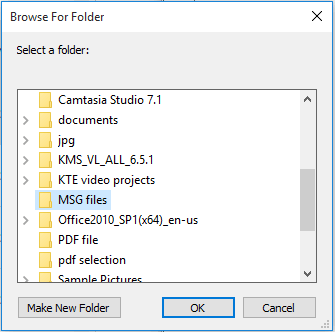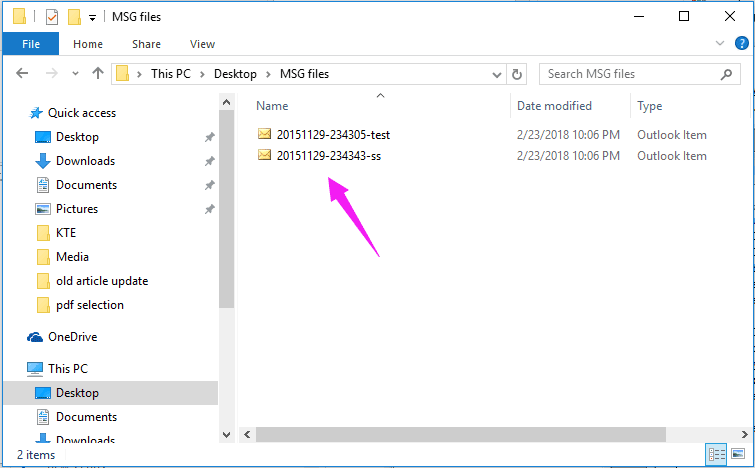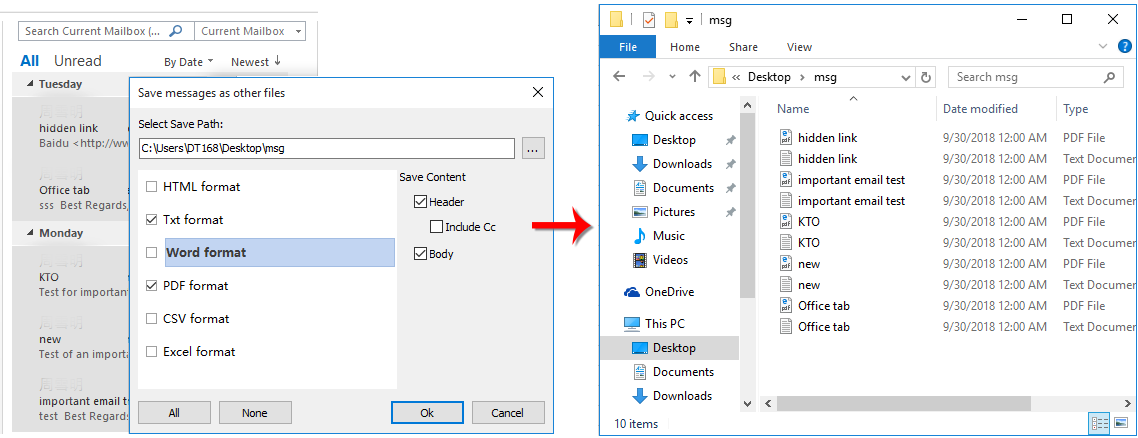Outlook에서 여러 개의 선택한 이메일을 일괄적으로 MSG 파일로 저장하는 방법은 무엇입니까?
Outlook에서 이메일을 MSG 파일로 저장하는 것은 쉽습니다. Outlook에서 여러 개의 선택한 이메일을 개별 MSG 파일로 일괄 저장하려면 어떻게 해야 할까요? 이 기사는 이를 달성하기 위한 방법을 보여드리겠습니다.
VBA 코드를 사용하여 여러 개의 선택한 이메일을 MSG 파일로 저장
VBA 코드를 사용하여 여러 개의 선택한 이메일을 MSG 파일로 저장
다음 VBA 코드는 Outlook에서 여러 개의 선택한 이메일을 개별 MSG 파일로 일괄 저장하는 데 도움이 될 수 있습니다. 아래 단계를 따르세요.
1. MSG 파일로 저장하려는 이메일을 선택하세요. 그런 다음 "Alt" + "F11" 키를 동시에 눌러 Microsoft Visual Basic for Applications 창을 엽니다.
2. Microsoft Visual Basic for Applications 창에서 "삽입" > "모듈"을 클릭하고, 아래 VBA 코드를 모듈 창에 복사하세요.
VBA 코드: Outlook에서 여러 개의 선택한 이메일을 개별 MSG 파일로 저장
Public Sub SaveMessageAsMsg()
'Update by Extendoffice 2018/3/5
Dim xMail As Outlook.MailItem
Dim xObjItem As Object
Dim xPath As String
Dim xDtDate As Date
Dim xName, xFileName As String
On Error Resume Next
Set xShell = CreateObject("Shell.Application")
Set xFolder = xShell.BrowseForFolder(0, "Select a folder:", 0, strStartingFolder)
If Not TypeName(xFolder) = "Nothing" Then
Set xFolderItem = xFolder.self
xFileName = xFolderItem.Path & "\"
Else
xFileName = ""
Exit Sub
End If
For Each xObjItem In Outlook.ActiveExplorer.Selection
If xObjItem.Class = olMail Then
Set xMail = xObjItem
xName = xMail.Subject
xDtDate = xMail.ReceivedTime
xName = Format(xDtDate, "yyyymmdd", vbUseSystemDayOfWeek, _
vbUseSystem) & Format(xDtDate, "-hhnnss", _
vbUseSystemDayOfWeek, vbUseSystem) & "-" & xName & ".msg"
xPath = xFileName + xName
xMail.SaveAs xPath, olMSG
End If
Next
End Sub3. 코드를 실행하기 위해 "F5" 키를 누릅니다.
4. "폴더 찾아보기" 대화 상자에서 MSG 파일을 저장할 폴더를 지정하고 "확인" 버튼을 클릭하세요. 스크린샷 참고:

이제 선택한 모든 이메일이 아래 스크린샷에 표시된 것처럼 개별 MSG 파일로 저장됩니다.

Outlook에서 선택한 이메일을 다양한 형식의 파일로 쉽게 저장하기:
Kutools for Outlook의 "일괄 저장" 기능을 사용하면 여러 개의 선택한 이메일을 HTML 형식 파일, TXT 형식 파일, Word 문서, CSV 파일 및 PDF 파일로 쉽게 저장할 수 있습니다. Kutools for Outlook의 무료 버전을 지금 다운로드하세요!

최고의 오피스 생산성 도구
속보: Kutools for Outlook 무료 버전 출시!
새롭게 달라진 Kutools for Outlook에서100가지 이상의 놀라운 기능을 경험해보세요! 지금 다운로드하세요!
🤖 Kutools AI : 첨단 AI 기술을 활용해 이메일을 손쉽게 처리합니다. 회신, 요약, 최적화, 확장, 번역, 작성까지 모두 지원합니다.
📧 이메일 자동화: 자동 응답(POP 및 IMAP 지원) / 이메일 보내기 예약 / 이메일 전송 시 규칙별 자동 참조/숨은 참조 / 자동 전달(고급 규칙) / 자동 인사말 추가 / 여러 수신자 이메일을 개별 이메일로 자동 분할 ...
📨 이메일 관리: 이메일 회수 / 제목 및 기타 기준으로 의심스러운 이메일 차단 / 중복 이메일 삭제 / 고급 검색 / 폴더 정리 ...
📁 첨부 파일 프로: 일괄 저장 / 일괄 분리 / 일괄 압축 / 자동 저장 / 자동 분리 / 자동 압축 ...
🌟 인터페이스 매직: 😊더 예쁘고 다양한 이모지 / 중요한 이메일이 오면 알림 / Outlook 종료 대신 최소화 ...
👍 원클릭 기능: 모두 회신 (첨부 파일 포함) / 피싱 방지 이메일 / 🕘보낸 사람의 시간대 표시 ...
👩🏼🤝👩🏻 연락처 및 캘린더: 선택한 이메일에서 연락처 일괄 추가 / 연락처 그룹을 개별 그룹으로 분할 / 생일 알림 제거 ...
원하는 언어로 Kutools를 사용하세요 – 영어, 스페인어, 독일어, 프랑스어, 중국어 및40가지 이상을 지원합니다!
한 번의 클릭으로 Kutools for Outlook을 즉시 활성화하세요. 기다리지 말고 지금 다운로드하여 업무 효율을 높여보세요!


🚀 원클릭 다운로드 — 모든 Office 추가 기능 받기
강력 추천: Kutools for Office (5-in-1)
한 번의 클릭으로 다섯 종류의 설치 파일을 동시에 다운로드하세요 — Kutools for Excel, Outlook, Word, PowerPoint 및 Office Tab Pro. 지금 다운로드하세요!
- ✅ 원클릭 편리함: 다섯 가지 설치 패키지를 단 한 번에 다운로드할 수 있습니다.
- 🚀 모든 Office 작업에 바로 준비 완료: 필요한 추가 기능을 원하는 때에 설치하세요.
- 🧰 포함됨: Kutools for Excel / Kutools for Outlook / Kutools for Word / Office Tab Pro / Kutools for PowerPoint